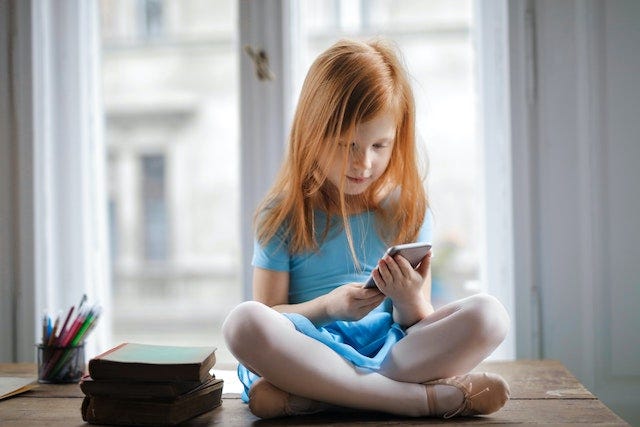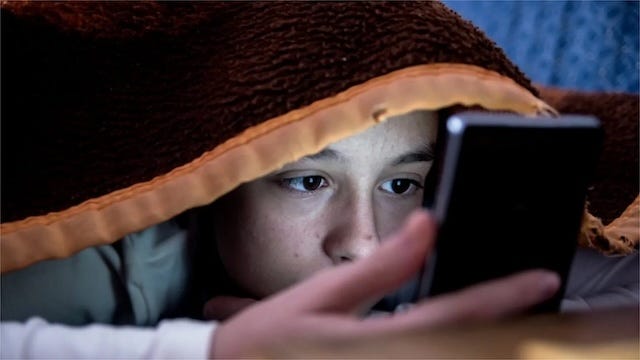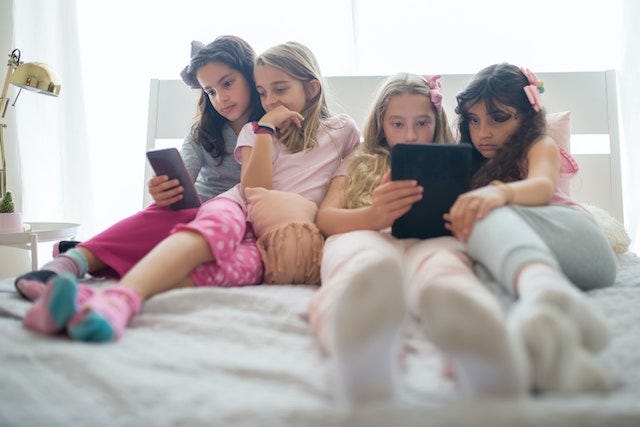Is your kid's device use jeopardizing their future happiness?
Devices, Opportunity Cost, and Your Kid’s Social Skills.
Parenting Matters #99
By: Catherine Lynch and Glenn Collins
Dear Awesome Parent,
Is your kid forgoing family time in favor of tablet time? We witnessed exactly that recently so you know we had to write about it.
But first a bit of news: You know how our newsletter comes out on Sunday mornings? Well, starting next week you’ll get it on Saturday mornings. Why? Because a Saturday morning deadline means we finish it on Friday, which means Saturday is free for family time, both planned and unplanned. That way we don’t have to choose between a birthday party or a surprise invitation, and work. The work will be done during the week, and weekends are once again free time for enjoying family and friends.
Have you ever wanted your kid's attention while they’re engaged with something on a device? A game. TikTok or YouTube. Social media.
Of course you have.
Frustrating isn’t it?
They’re so engrossed it’s like pulling teeth to get them to pay attention to you.
You want to interact, but what they’re doing on their device is obviously more important, more interesting, or more engaging than talking to you.
It doesn’t feel good.
We witnessed just such an interaction last weekend at our daughter’s house where we’d gone for breakfast. Our daughter was cooking in the kitchen and her 7 year old son was at the table playing a game on his tablet. As breakfast got closer, she asked him to put the tablet away and get ready for breakfast.
Nothing.
So she asked him again. More loudly and insistently.
Still nothing.
Finally she raised her voice and called his name sharply. That got his attention. He knew that tone. It meant his mother was close to losing her temper and would take the tablet away if he didn’t respond and do what she wanted.
So he put the tablet down.
Breakfast was served and a lively conversation ensued. But our grandson didn’t join in. He sat glumly staring at his plate. After eating a couple bites he said he wasn’t hungry and asked to be excused. Mom told him to just sit with us while we ate - which he did for another minute or so. He then said his stomach hurt and asked if he could go lie down. She said OK, but to leave the tablet. He left the room, but came back a bit later and grabbed his tablet while his mother wasn’t looking.
We’ll come back later to what she did when she discovered what he’d done.
In this case, our daughter wanted her son’s attention so he would do something she wanted - for him to get ready for breakfast with the family. But there are plenty of times when we want our kids’ attention so we can have a conversation, do something with them, or just hang out. Because we love them and want to spend time with them.
This is when it’s especially painful to be shut out in favor of whatever they’re viewing on the device.
The currency in any relationship is the time, attention, and caring that both people put into it. There’s also varying degrees of “What’s in it for me”, but in a personal relationship - like with your kids - hopefully the WIIFM is the time, attention, and caring. When someone you care about doesn’t want to spend time with you or give you their attention, it hurts. Especially if it’s just to play another another game, watch another TikTok, or consume some other purely entertaining digital content.
We only have so many hours in the day, and we have to make choices about how we spend our time. And so do our kids. Now subtract off all of the things they have to do: Sleep, eat, school, homework, chores etc…. What’s left is their “free” time. Time where they have a certain amount of discretion about how they’re going to spend it.
Opportunity Cost
This is where the idea of opportunity cost comes in.
The New Oxford American Dictionary defines opportunity cost as "the loss of potential gain from other alternatives when one alternative is chosen” Put more simply: whenever you’re doing anything, that’s time you’re not doing something else.
When we think about time this way, specifically how we choose to spend our time, it means that when we choose a particular activity, we forego the benefits of all the other activities we could have chosen.
Now lets apply that to our kids and their devices:
An hour spent on a device playing a game or watching TikTok is an hour not spent doing something else. Homework, chores, playing a sport, learning a musical instrument, pursuing a hobby, reading a book. You get the idea. But the biggest missed opportunity is social interaction. Specifically, social interaction with you, the one who is trying to teach them all the things, …, and shape their values.
Relationships take work. We can’t just do whatever we want all the time. We have to make compromises and sacrifices for the sake of the relationship. As adults we know this. Our kids? Not as much.
They have an instinctive understanding of these concepts. They play (giving time and attention) with the kids who they have a good time with and avoid those with whom they don’t. They can be generous (I’ll let you play with my toy) and be willing to compromise (we can play what you want instead of what I want)
But a conscious level understanding that they have to give up what they want (device time) in order to put time into a relationship? That’s a high level idea that most kids haven’t fully grasped. Truth be told, it’s hard for us adults, too.
You might be saying “Well, they’ll grow up and pick it up over time. They’ll be fine.”
And you’d be right.
But most of our readers aren’t satisfied with their kids being “fine”. They’re looking for something more than that. And they know that anytime we can give our kids a leg up on a critical life skill, we’re upping the chances that they’ll have happy and successful adulthoods.
Should we expect our kids to instantly pick up the idea that they sometimes need to put their device down and spend quality time with you for the good of your relationship? Of course not. But the earlier we can get them thinking in these terms, the easier it will be for them to recognize it and start to do something about it. It becomes part of the their relationship lexicon. An awareness that you have to put in an effort to make relationships work.
Our kids are embedded in the broader culture we live in. And we can’t change the norms that are developing around device use. Like it or not, they’re going to pick those up. The way devices are used by their peers will form a big part of what’s “normal” to them.
So, what to do?
Our home, and the culture we create there, is the place where we have an impact on how our kids develop. It’s a small island where our values prevail. But our long-term influence is limited by how much they actually internalize our values. And that is a function of the strength of our relationship with them.
If we rail at them and tell them that devices are rotting their brains or that they’re wasting their life watching stupid TikTok videos, they’ll just tune us out and think we’re out of touch. That we just don’t understand. (And they’ll be right.)
Note: We’re not anti-device. And we’re not against letting kids have time on devices. We’re for balance. We’re for understanding the opportunity cost of too much device use. Time on the device means they’re missing out on the benefits of the other things that they could be doing that will help them live happy, healthy lives. Especially learning good interpersonal skills. Researchers at Harvard, in the longest running study on happiness ever done, have found that having good relationships is the single most important factor in whether or not someone is happy in life.
Obviously, devices aren’t going anywhere and our kids have to be technologically savvy. But other skills are critical too, and Interpersonal skills are up there among the most important. Knowing how to have good, healthy relationships will have more of an impact on their future happiness than just about anything else we can help them learn.
Here are our suggestions for how to work on that tricky balance between devices and in-person social interaction.
Prioritize the relationship with your kid. This is the single most important thing you can do. The relationship they have with you is their primary template for how relationships are supposed to work. Beyond that, a good relationship increases the likelihood they’ll adopt your values as an adult. Including about devices and relationships.
Have a device policy. Managing your kid’s device use is way easier if there’s a set of rules that everyone knows and understands. Need help creating one? Here’s a link to our guide for creating one.
Role model balanced device usage. Don’t let your device be your go-to way to spend free time, Make sure your kid sees you pursuing hobbies and interests in your spare time. This lets them see first hand that a good life isn’t centered around devices. This also makes it easier for you when you insist they put their device down - you’re not being a hypocrite.
Have conversations about how devices affect relationships. Talk about how you feel when their device usage is shutting you out. Ask them if they’ve encountered situations where they wanted someone’s attention and that person ignored them in favor of being on their device. The more you listen (and not just talk)
Empathize with their desire to be on their device. Empathy takes some of the sting out of being told “No“. and lessens the negative impact such interactions can have on your relationship. For example: “I know you really want to be on your tablet. So do I! It’s really fun! We’ll make sure you get tablet time later.”
So what did our daughter do about her son and the tablet? She did what we’d all probably do: She went into his room, told him she’d said not to take the tablet, and took it away. In fact he lost his tablet privileges for the rest of the day - though we weren’t there all day see how it played out.
How do you handle it when devices interfere with your ability to connect or communicate with your kid? Leave a comment and let us know. This is an important topic and the more tools we have the better we can all do!
Dawn Moon
The moon going down as the sun came up created this beautiful scene.









There's one other factor here that's really important to consider: when they choose electronics over people, who are they imitating? It's a good opportunity for self-reflection. Obviously, we adults have a better gauge of what needs to get done, and what's important. Maybe we're answering emails that can't wait. But the kid doesn't understand that. To them, their play is equally as important as your work. So we need to be careful of what we're modeling and how we communicate when something can't wait.
Thanks for your article! It's refreshing to read a piece calling for balance instead of screaming the extreme.